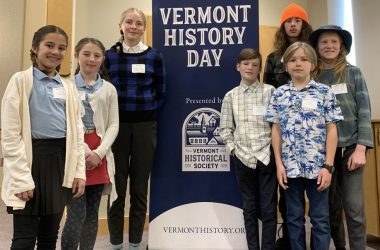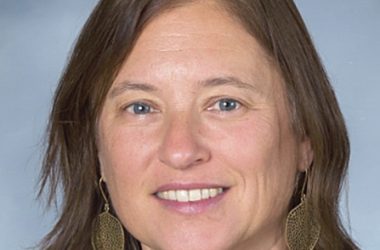
courtesy photo
“The Pollinator Report” production team and members of “The Swarm”, covering a recent press conference at the Vermont Statehouse were (left to right) Aro Veno, Emily Lanxner, Zoryan Ivakhiv-Gray and Auriel Gray.
VERMONT — On March 22, the Vermont House passed H.706, an act relating to the use of neonicotinoid pesticides. It now moves on to be considered by the Vermont Senate.
Rep. Chip Troiano, (Hardwick, Stannard, Walden), who is a co-sponsor and voted in favor of the bill said, “in 2018 the Neonicotinoid bill that I sponsored initially had a section to ban treated seeds that was removed before it passed.”
“That bill did remove neonicotinoids from the shelves of our hardware stores,” he continued and added, “Since then New York and Vermont have learned that there is, in fact, no increase in crop yield from treated seeds. So, a ban on treated seeds will be part of this bill and it will further protect our pollinators. Without pollinators we have no food.”
Zoryan Ivakhiv-Gray of Greensboro and Barre, who played a role in Greensboro’s approval of a Town Meeting Day measure to become a pollinator-friendly town, says he is “really happy, excited and hopeful that 80% of the House voted in favor of the bill.” The 13 year-old student added that he hopes the momentum will continue into the senate.
Hardwick’s Emily Lanxner, who started the Honeybee Steel Band in 2015, along with supporters dressed as bees, called “The Swarm” has been bringing attention to the plight of our nation’s dwindling bee population.
Lanxner told the Gazette, “I was able to listen in to the testimony . . . and was so thrilled about bill H.706 passing! It really heartened me to hear so many legislators speaking out in favor of the bill and over a hundred of them voting to protect pollinators.”
According to a Joint Fiscal Office summary, the bill would ban certain uses of neonicotinoid pesticides beginning on July 1, 2025, and the use of neonicotinoid treated soybean and cereal grains and crop seeds starting January 1, 2029. It would also create an exemption order process at the Agency of Agriculture, Food, and Markets (AAFM), which would allow use of specified neonicotinoid products in certain applications.
Lanxner echoed Troiano’s comment about the ineffectiveness of this class of pesticides: “Although I know that some dairy farmers are concerned that they might take a hit economically, hundreds of studies point to the fact that there is no economic gain in using the neonic-coated seeds. The most compelling evidence about this was from a recent panel of farmers from Quebec who have switched over to more sustainable practices with no economic losses.”
Ivakhiv-Gray, who has been to the statehouse twice lobbying for the bill, looks forward to having an opportunity to testify before the senate. He hopes he can help senators understand the importance of enacting the ban.
He is now co-host of “The Pollinator Report” with Lanxner, which airs on Central Vermont Community Radio the third Saturday of each month from 9 a.m. to 10 a.m. and can be listened to at WGDH, 91.7 FM in Hardwick, or livestreamed at wgdr.org
Lanxner isn’t nearly ready to end her campaign yet, saying, “With Vermont on the way to joining New York State in a ban of neonic-coated seeds, our efforts will decidedly become a template for other states to put the same actions in place. This is truly a global issue. Perhaps New England will become an agroecology corridor. I feel hopeful.”
Katherine Sims, who seemed initially inclined to support the bill, shared a message she wrote before she voted against H.706., writing, “This is a bill that I’ve been wrestling with, wanting to both respond to the data on neonicotinoids and to support a just transition for those using them and those affected by them.
“Over the last few weeks, I’ve reached out to a number of farmers from our area who would be impacted by the ban to hear their perspective on the bill.”
She says they’ve told her, “Small to mid-sized dairy farms continue to operate in an increasingly precarious economic situation. They rely on neonicotinoid-treated seeds as a part of their pest management practices. They have concerns about the availability of untreated seed (quantity and variety.) They are concerned about the possibility of incurring higher costs if they were to switch to untreated seeds. Without state assistance to support the transition away from neonicotinoid-treated seeds, they are worried the ban could make it even more difficult to make ends meet. Some said, they see this bill as a referendum on dairy farming and commodity crop production.
“As a result of these conversations, I think we need to do more in the bill to provide a safety net for farmers as they transition to alternative seed and seed treatments, such as: Additional research and reporting on the alternatives to neonicotinoid treated seeds, the availability of untreated seeds, and the economic risks and impacts to farmers; Simplifying the process for temporarily waiving the ban when the unavailability of untreated seed would cause undue financial hardship on farmers in Vermont; Providing financial assistance or incentives to support farmers through the transition away from neonicotinoid-treated seeds.
“I do expect the bill will pass the House; then it will go on to the Senate, where they will continue to work on the bill. I’m hopeful that the Senate will work to address some of these concerns and that when it comes back to the House, I will be able to support the bill,” wrote Sims.
She added, “In making these difficult decisions I believe it is important to let you know how I plan to vote and why.”
The bill has had its first reading in the senate and is now being reviewed in the Committee on Agriculture.
Ivakhiv-Gray encourages Vermonters to write email messages to their senators because most people don’t and “even 10 emails could be a lot.”
Lanxner added, “Another point in favor of the economic benefits of Vermont’s support of sustainable agriculture is that the ‘Made in Vermont’ label will start to mean something once again.”
Paul Fixx is editor of The Hardwick Gazette and lives in Hardwick.






